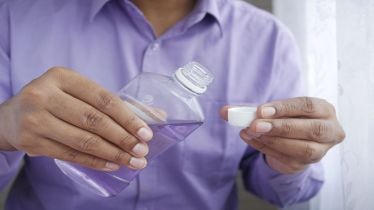Mouthwash, also known as mouth rinse, is extremely popular has it contains antibacterial ingredients to clean between your teeth. These mouthwashes also help in reducing bad breath.
However, health experts often warn against the excessive use of mouthwashes as it can lead to serious ailments like oral cancer. According to a review published in the Dental Journal of Australia mouthwashes have a high level of ethanol content. Consequently, this allows cancer-causing substances to pass more easily through gum tissue.
Moreover, acetaldehyde, a by-product of alcohol can cause cancer-causing substances that can gather when mouthwashes are swished in the mouth. The 2009 study also revealed that many of the popular mouthwash brands available in the market contain nearly 26 percent alcohol.
A 2016 study concluded that people who regularly use mouthwash may have a slightly elevated risk of head and neck cancers than people who never used mouthwash.
Another research published in the Frontiers Research Foundation journal highlighted that acetaldehyde which is a potentially toxic substance can cause addiction as it compels the brain to consume more of it.
It is noteworthy that some types of mouthwash contain alcohol as an inactive ingredient, while others are alcohol-free.
If a mouthwash contains sodium lauryl sulfate (SLS), it may lead to canker sores inside the mouth. Moreover, a mouthwash that contains alcohol may actually make symptoms of dry mouth worse.
According to a review published in 2019, the most common side effect of using mouthwash is teeth staining.
What happens when you overuse mouthwash?
Some of the symptoms of excess usage of mouthwash include:
- persistent or inflamed canker sores
- bleeding gums when you use your mouthwash
- dry mouth
- pain or sensitivity when you brush your teeth after using mouthwash
- teeth staining
